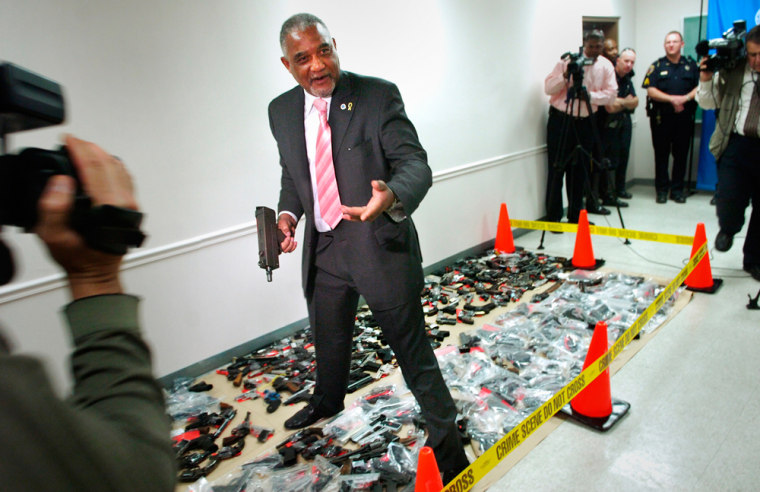Jack Ellis was elected Macon’s first black mayor amid high hopes he would bring the city together. Instead he has divided it with one move after another — trips to Africa at taxpayer expense, his conversion to Islam, his reaching out to Venezuela’s anti-American president.
He has also survived recall efforts, constant bickering with the City Council and repeated federal grand jury investigations into public spending.
Now, with just months to go before Ellis leaves office, some civic leaders in this city of 95,000 can only look back and wonder what might have been.
“People were really excited when he was first elected eight years ago. As a community, we felt it was time, and he got a lot of the vote across all demographics,” said Nancy White, a first-term city councilwoman who is white. “But a lot of people feel like he let the city down. There’s a lot of disappointment. It could have been so much better.”
In fact, the divisiveness has prompted the mayor’s apparent successor, fellow Democrat Robert Reichert, a white lawyer who is the choice of the Macon business establishment, to run on a platform of reconciliation.
A towering 61-year-old with a booming voice and salt-and-pepper hair, Ellis is unapologetic about his record.
“I have a certain power that’s granted,” he said. “I don’t abuse it, but I use it. That’s what power is for — to be used.”
Surprise electoral victory
One of 13 children born to a poor sharecropper, Ellis grew up outside Macon with three siblings crammed into one room. He served in Vietnam with the Army, worked on Jesse Jackson’s presidential run in 1988, then made a name for himself with a local-access TV show that pushed for the expansion of Macon’s bus system and came out against a proposal to give city land to a club with no black members.
He got elected mayor in 1999 on his second try with significant white support in this city, where 66 percent of the residents are black and one in three lives below the poverty level. His victory against the establishment’s favorite came as a surprise to many.
He soon won accolades for his efforts to stabilize the city’s worst neighborhoods. He obtained a $21 million federal grant to rebuild a rundown district near downtown, an ambitious project he kicked off by wrecking his mother’s old home first.
And he received national attention for sticking up for former Atlanta Braves pitcher John Rocker, a Macon native who Ellis said was “misunderstood” in 2000 when he made derogatory comments about minorities, gays and foreigners.
Along the way, he has been married and divorced three times and has had five children.
Investigations into city spending
Soon, though, infighting with the City Council began to dominate much of his time. Repeated grand jury investigations have looked into how the city spent $12 million in bonds, but have so far yielded only one arrest, later thrown out. And the council has scrutinized the mayor’s frequent trips to Africa, where Ellis said he was trying to build stronger economic ties.
He blames the infighting on jealousy among council members and “not having a council who could understand my vision.”
Over the summer, some rolled their eyes when Ellis invited Jane Fonda on a trip to Vietnam next year for the 40th anniversary of the Tet offensive.
Bid for attention?
In December, Ellis announced that he had converted from Christianity to Islam in a ceremony in Senegal, the west African nation where he traced his ancestors, and that he plans to change his name to Hakim Mansour Ellis.
Local critics viewed it as another bid for attention. (The Arab news organization Al-Jazeera, for one, visited Macon after he converted). A Macon lawyer’s Web site devoted to satirizing local politics established a “Hit the Road Hakim-O-Meter” counting down Ellis’ last days in office, and joked that he converted to get free trips to Muslim conventions.
“To me it was a very personal matter, as religion should be,” the mayor said. “We are a nation of religious freedom, but deep down I think that means you could be any type of Christian.”
In August, some residents called for demonstrations after Ellis reached out to Venezuelan President Hugo Chavez, a vocal ally of Iran and Cuba who has called President Bush “the devil.”
“We’ve kind of gotten used to unusual comments and actions from him over the last eight years. A lot of them we kind of just cringed at,” said Republican state Rep. Allen Peake. “But that was one we felt like we had no choice but to respond. I think it tainted the city. We were receiving e-mails from all over the country from people refusing to come to the city.”
But Ellis said Chavez has “done a lot of good alleviating poverty and directing resources back to the people. My point was — then and now — I commend him for those efforts.”
Future plans: Work on Ghanan campaign
As for his plans after leaving office, he is starting an international consulting firm and will be helping a candidate run for president of Ghana.
For now, he is relishing his final days in office and is eager to show a Macon train station he helped the city purchase, where he proudly points at the “Colored Waiting Room” sign he ordered uncovered because “we don’t sweep history under the rug.”
He said he hopes the revived station will be a constant reminder of his tenure.
Others have a different view of his legacy.
“What we’ve learned is leading a city does take experience. And we have a much more savvy electorate now,” said White, the councilwoman. “We are beyond racial politics. We’re a lot more savvy and discriminating in what we look for. And that’s a good legacy.”
